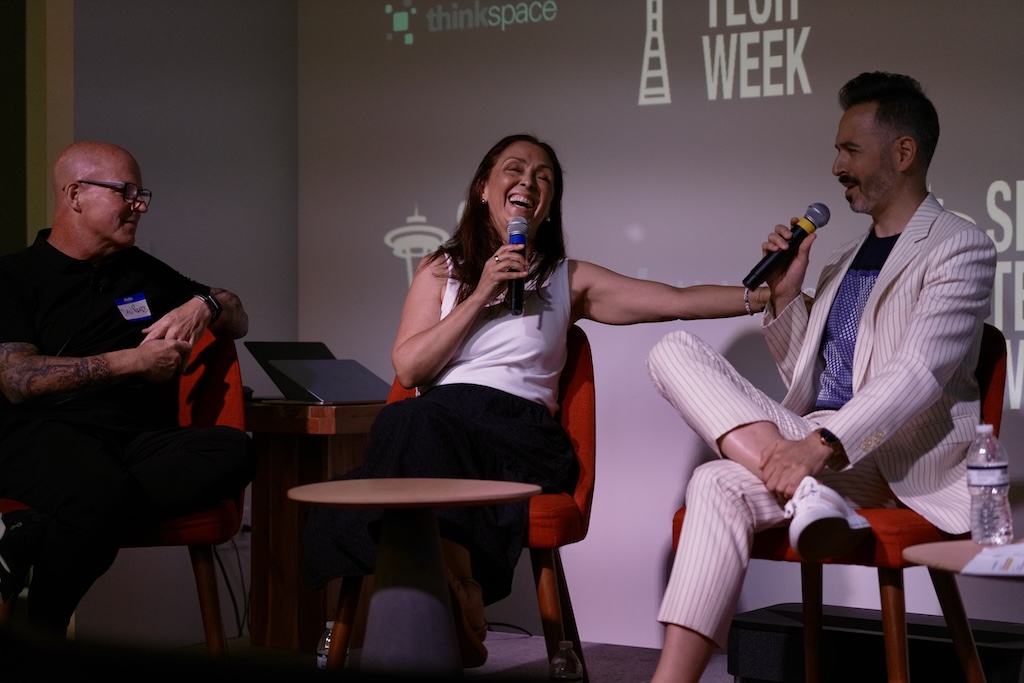This is a guest post from one of our thinkspace members, Matt Heinz president and founder of Heinz Marketing.
Some of the most successful and productive people I know are lazy. They’ll tell you so.
David Allen, author of Getting Things Done and the godfather of productivity. Lazy. He will tell you this at the beginning of his seminar.
Seth Godin, who writes daily blog posts and has published four hundred books and continues to launch new businesses. Lazy. He told us so in a talk a couple weeks ago.
There’s a theme and a lesson here. You can be highly productive and very successful – but also lazy. The trick, of course, is to make better use of your time. Work smarter, not harder. Here are eight ways to do that.
1. Do the opposite of what the lizard brain tells you to do
Seth’s right, we all have a lizard brain telling us what to do. It’s what makes us procrastinate, keeps us from shipping, and leads us away from taking risks or having courage to do something new. Seth told a crowd in Seattle a few weeks ago that the secret to his success has been simply to do the opposite of what his lizard brain would prefer that he do. Not bad advice.
2. Delegate & outsource
No matter your role or level or experience, you shouldn’t be doing everything that’s on your plate. There are things you should delegate to others on your team, or outsource to someone who’s better suited to do it. Some activities should be delegated because they’ll get done better by someone else. Other tasks can be done faster or cheaper elsewhere. But be crisp about what your time is best spent doing, and what would be easier/faster/better to do elsewhere (for a fraction of your time to instruct and/or manage).
3. Do less (but choose wisely)
Cut at least 33 percent of the work from your current plate. Would you really miss it? Would it really impact your performance, your company’s performance, or your customer’s overall satisfaction? I’m not talking about short-term conversations or loss. It’s critical to triage what you have on your plate against what will have long-term, lasting and scalable impact.
4. Say “no” more often (or, stop volunteering so much)
Type-A people want to lead. They want to own things. They’re more likely to say “yes” to a new project, or volunteer for something new. Dial that back a bit. The potentially awkward and uncomfortable moment in which you need to decline a new opportunity will save you hours or days of time down the road.
5. Network
The more people you know, the more likely you’ll find people you can turn to when you need help, or for something that can help both of you. It doesn’t work if you’re merely adding volume to your network and follower lists. But if you genuinely and consistently add new qualified people to your network, the chances that they’ll be able to help you sooner or later increases exponentially.
6. Listen, watch or learn more
The next time you’re in a meeting, shut up. Spend more time listening to others, asking for their feedback, watching what’s going on. In too many meetings, people compete for attention. They talk over each other. They fight to see who can say the smart thing first. It’s a losing proposition for everyone. The more you listen, the more likely someone in the meeting will stop the conversation and ask what you think. At that point, all eyes are on you. In less time, and after listening to the preceding debate, your feedback will more likely be thoughtful, better received, and could drive the output of the meeting more frequently.
7. Have other people read for you
I could spend all day reading the various sources of content (print, online, Web, email, blog, video, etc.) that I subscribe to. My favorite sources of content are those where others have already done far more reading, and have filtered the best content up to me. Read less but learn more.
8. Stop working nights & weekends
The amount of work you have will consume the time you give it. And if you cut yourself off at 6:00 p.m. on weekdays and on Friday night, it forces you to be more focused and productive during your active work hours. You know that you’re checking ESPN headlines or Facebook or other non-work stuff during the workday. What if you cut some of that out and forced yourself to focus (and focus on the shorter list of work we identified above)? You’ll get more done, in less time, and feel better about refreshing nights and weekends.
What else do you do that’s both lazy and productive? Where have you cut back to be more productive and successful?
Read more from Matt Heinz’s blog at Matt on Marketing.
